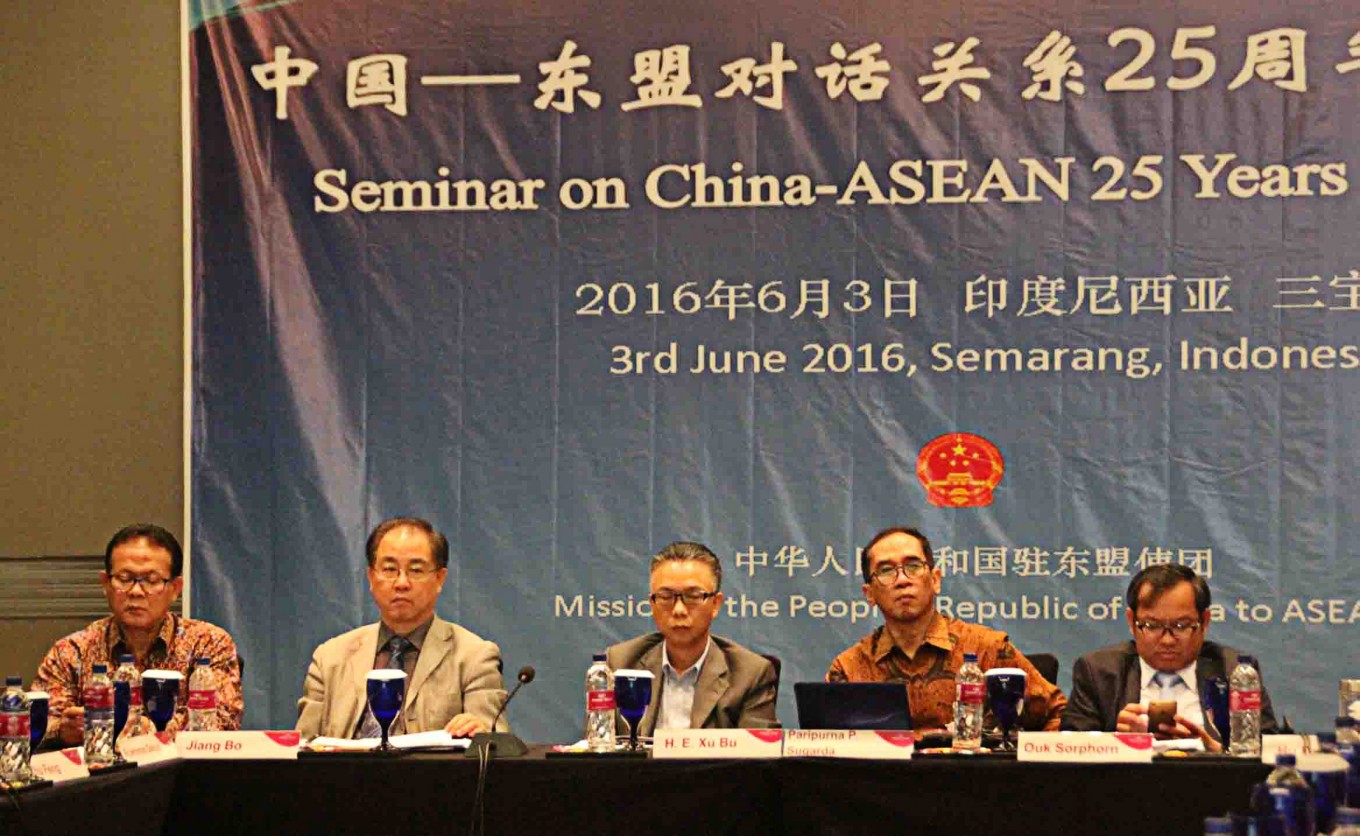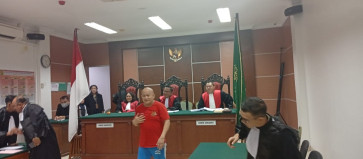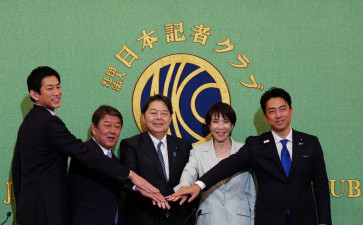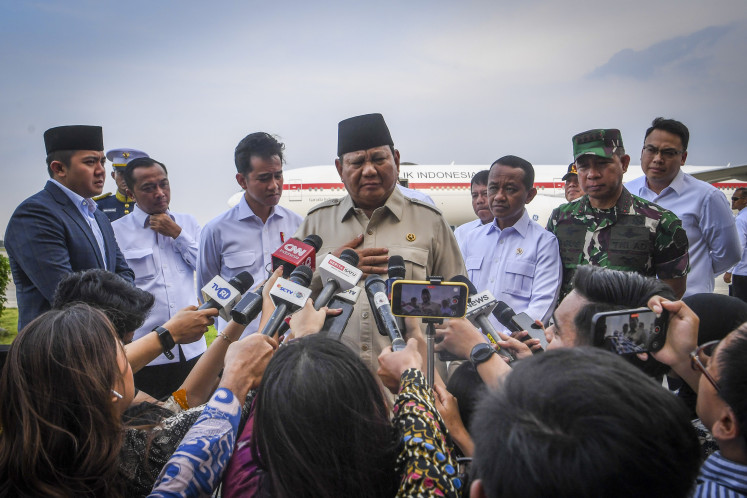Popular Reads
Top Results
Can't find what you're looking for?
View all search resultsPopular Reads
Top Results
Can't find what you're looking for?
View all search resultsChina, ASEAN celebrate 'diamond decade' of relations
Change text size
Gift Premium Articles
to Anyone
C
hinese Ambassador to ASEAN Xu Bu has said China and ASEAN will achieve broader and deeper cooperation as they have entered the “diamond decade” of their relations.
Speaking in a seminar, which marks the 25th anniversary of China-ASEAN Dialogue Relations, in Semarang, Central Java, last week, Xu Bu said ASEAN stood out in its neighboring region as the priority of China’s diplomacy.
Xu Bu said 2016 was the year, which marked the opening of the ASEAN Community, the starting of China’s 13th Five-Year Plan and the 25th anniversary of China-ASEAN Dialogue Relations.
"If the first 10 years were seen as the ‘golden decade’ for China-ASEAN relations, just as Chinese Premier Li Keqiang put it, we have now ushered in a new era for China-ASEAN relations, the ‘diamond decade’, which boasts broader and deeper cooperation," the ambassador said in his remarks during the seminar. Several experts from China and ASEAN member countries attended the event, where they discussed various issues.
China and ASEAN established the Strategic Partnership for Peace and Prosperity in October 2003.
Xu Bu explained that since the launch of their dialogue relations 25 years ago, China and ASEAN had made great achievements in practical cooperation across all fields.
In 2015, China-ASEAN trade aggregate topped US$472 billion, China-ASEAN two-way investment amounted to more than $156 billion, substantially increased people-to-people relations and there were more than 180,000 exchange students sent by both China and ASEAN countries, he added.
Xu Bu said China had been ASEAN’s biggest trading partner for seven consecutive years, while ASEAN ranked as China’s third largest trading partner for four consecutive years. Every week, he further said, there were more than 1,000 flights shuttling between China and ASEAN countries.
“Closer economic ties, greater financing links and richer people-to-people exchanges between China and ASEAN bond our destinies much tighter than ever before,” the ambassador said.
He went on to say that the building of the ASEAN Community had provided a fresh opportunity to further deepen China-ASEAN economic cooperation and trade.
“The liberalization and facilitation of trade in goods and services and investment in our region have reached a new stage. In terms of trade in goods, ASEAN has generally achieved free movement of goods within the region. ASEAN consumers are enjoying a wide range of choice in both quality and price of products.”
Since adopting a package of policies in 1995 on liberalization of trade in services, ASEAN has formulated nine relevant policy sets under an ASEAN Framework Agreement on Services, which has helped enhance institutional transparency and market penetration rates.
"The employment conditions for doctors, architects, tour guides and other professionals have also been greatly improved. In terms of investment, the implementation of the ASEAN Comprehensive Investment Agreement has effectively given rise to freer intra-regional movement of capital and a better business-friendly environment," Xu Bu said.
He said the building of the ASEAN Community had injected vitality into the upgrading of the China-ASEAN free trade Area.
“The protocol pronouncing the full conclusion of China-ASEAN negotiations on upgrading our FTA was signed in November last year, and it will take effect in the coming July. Broader markets, more convenient terms of trade and a better investment environment in ASEAN will help achieve a speedy and steady upgrading of the China-ASEAN FTA,” he added.
Xu Bu said the building of the ASEAN Community also facilitated the negotiation process of the Regional Comprehensive Economic Partnership (RCEP), which was currently at a crucial stage.
“China fully respects ASEAN centrality in the negotiation process and stands ready to work together with ASEAN toward the early conclusion of negotiations within this year in the spirit of minimizing differences and maximizing convergences,” said the ambassador.
He further said China was also willing to join hands with ASEAN to accelerate bilateral and multilateral trade negotiations and create a favorable trade and investment environment, so as to increase the China-ASEAN trade volume to $1 trillion and two-way investment to $150 billion by 2020.
On the implementation of the ASEAN Economic Community Blueprint 2025, Xu Bu said, China would help ASEAN countries with infrastructure development, industrialization and industrial upgrading. “We will also strive to speed up the construction of the China-Laos railway, China-Thailand railway and Jakarta-Bandung high-speed railway projects and promote the construction of a Trans-Asian railway network, so as to level up the connectivity and promote trade and personnel exchanges in this region," Xu Bu said.
Meanwhile, Rokhmin Dahuri, professor in Coastal and Ocean Management, from the Bogor Institute of Agriculture (IPB), said a stable and peaceful Asian region was highly important and needed not only for nations within this region, but also for the international community as a whole.
“Despite a remarkable progress in economic development achieved by both China and ASEAN countries in the last two decades, except for Singapore, Brunei Darussalam, and to some extent Malaysia, the remaining seven ASEAN countries and also China are still confronted with high unemployment, poverty, health and sanitary problems," said Rokhmin, who is also President of the Indonesia Aquaculture Society.
Rokhmin explained that based on gross domestic product (GDP) per capita, only Singapore and Brunei Darussalam had achieved a status as a high-income country as their GDP per capita was higher than $11,750. Meanwhile, on the basis of GDP per capita and technological capacity, it was only Singapore that had achieved a developed country status since 2010.
"In other words, China and eight ASEAN nations have a long way to go to materialize the dream of every nation on Earth [in wanting] to be a developed and prosperous country. It is therefore compulsory for China and ASEAN member countries to have a stable region and peaceful global social-political environment,” said Rokhmin.
“Without regional stability and peace, investment and trade among nations would be hampered. And, this situation will in turn reduce economic growth, employment creation, and prosperity of people in the region," he went on.
Rokhmin said the world’s community needed mutual, peaceful, productive, and sustainable China-ASEAN relations because since the Global Financial Crisis in 2008, China and ASEAN countries had been the growth engine of the global economy.
“China and ASEAN combined is economically the most dynamic region in the world whose growth rate is three to four times higher than that of developed countries such as the US, Canada, EU, and Australia," said the former fisheries and maritime affairs minister. (ebf)







